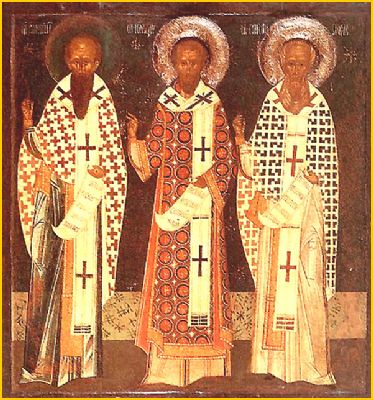|
|||
|---|---|---|---|
| This weekly bulletin insert complements the curriculum published by the Department of Christian Education of the Orthodox Church in America. This and many other Christian Education resources are available at http://dce.oca.org. | |||

In Luke 21:1-4 we read the story of the poor widow who donates two copper coins to the temple treasury. Jesus watches as rich people contribute, and also as she makes her contribution. He then says that "she has put in more than all of them; for all of them have contributed out of their abundance, but she out of her poverty has put in all she had to live on." The Church honors the Three Hierarchs: Basil the Great, Gregory the Theologian (Gregory of Nazianzus) and John Chrysostom. All three men, in various ways, embraced poverty even though they were well-educated and articulate, and could have lived relatively easy lives. Out of their chosen poverty each man made huge contributions to the well-being and building up of the Church. Like many other Christians, these three scholars and bishops often faced fierce opposition. Basil, for example, had to contend with the hostility of the Arians, who were determined to supplant the Church's teaching that Christ is the eternal and divine Son of God with their own idea that He was a created being who had not always existed. The Arians had convinced Valens, the emperor, that they were right in what they believed and taught. Over the years he had exiled many bishops who stood up for the Church's true teachings, or who displeased him in some way. Now it was Basil's turn. The emperor very much wanted to get rid of such an influential enemy of Arianism as Basil. He and his entourage came to Cappadocia, and he sent an emissary to the bishop's residence in Caesarea to threaten Basil with banishment, physical punishment, and possible death. Basil's answer was fearless and uncompromising:
"If you take away my possessions, you will not enrich yourself, nor will you make me a pauper. You have no need of my old worn-out clothing, nor of my few books, which are the entirety of my wealth. Exile means nothing to me, since I am not bound to any particular place. The place in which I now dwell is not mine, and any place you send me shall be mine. Better to say: Every place is God's. Where is a place in which I would be neither a stranger nor a sojourner? And who can torture me? I am so weak that the very first blow would render me unconscious. Death would be a kindness to me, for it will bring me all the sooner to God, for Whom I live and labor, and to Whom I would gladly go quickly." There is a difference between Saint Basil and the poor widow. His poverty was voluntary; hers was probably the result of life circumstances she didn't choose. But the two are the same in putting God before anything else. We may not share his choice or her circumstances, but we can follow both their examples, and "put in (for God's service) all we have." |
|||
